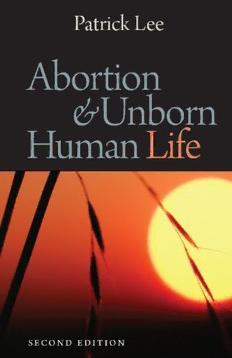
Abortion and Unborn Human Life PDF
Preview Abortion and Unborn Human Life
Abortion • & Unborn Human Life Patrick Lee Abortion • & Unborn Human Life Second Edition The Catholic University of America Press Washington, D.C. Copyright © 2010 The Catholic University of America Press All rights reserved The paper used in this publication meets the minimum requirements of American National Standards for Information Science—Permanence of Paper for Printed Library materials, ANSI Z39.48-1984. ∞ Library of Congress Cataloging-in-Publication Data Library of Congress Cataloging-in-Publication Data Lee, Patrick, 1952– Abortion and unborn human life / Patrick Lee.—2nd ed. p. cm. Includes bibliographical references and index. ISBN 978-0-8132-1730-7 (pbk. : alk. paper) 1. Abortion—Moral and ethical aspects. I. Title. HQ767.15.L44 2010 179´.76—dc22 2010006653 To Frederick D. Wilhelmsen, in gratitude and friendship • Contents Preface to the Second Edition ix Acknowledgments xiii Introduction 1 1 Do Unborn Human Beings Become Persons after Birth? 8 2 Do Unborn Human Beings Become Persons during Gestation? 47 3 When Do Individual Human Beings Come to Be? 71 4 Is Abortion Justified as Nonintentional Killing? 108 5 Consequentialist Arguments 140 Works Cited 165 Index 173 • Preface to the Second Edition Since 1996 when the first edition of this book appeared, the debate about the morality of abortion has not subsided. From the standpoint of philosophy many issues have be- come clearer. In my judgment, the course of the debate has confirmed the position I defend in this book, namely, that unborn human beings have an equal and inherent dignity and are subjects of basic rights from the moment they come to be, which is at fertilization. In this second edition I have not attempted a complete rewrite of the original, since I believe the basic structure and overall argument set out in the first edition remain sound. Three developments, however, required significant updating. The first of these developments has been an added pre- cision required for the argument against the gradualist posi- tion (the position that a human being only gradually comes to be). Criticism of the argument I originally set out in the first edition, especially by Dean Stretton, helped me to see that two distinct propositions need to be established in or- der to show that you and I are intrinsically valuable as sub- jects of rights from the moment we come to be—that is, we do not come to be at one time but become intrinsically valu- able only at a later time. Not only are human beings them- selves valuable, rather than being mere vehicles as it were for what is intrinsically valuable (something made clear in the first edition), but we also are valuable in virtue of the fundamental kind of being (substance) we are (not clearly ix
